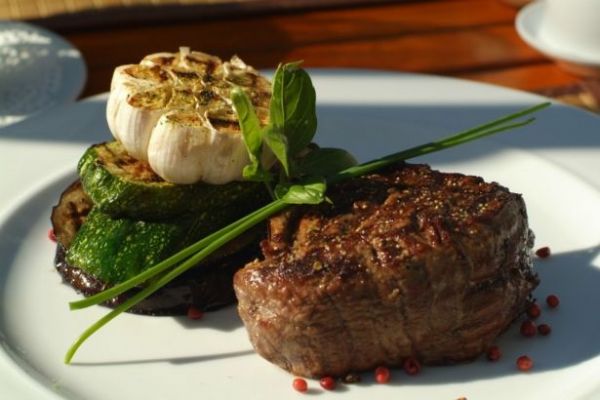Richard H. Turner is serious about meat. The chef behind the popular British steakhouse chain Hawksmoor doesn’t mince his words.
Grain-fed beef? Gives you an "instant slap round the chops, and then the fat explodes in your mouth like a pustule," he says. Wagyu beef is "despicable, the foie gras of the beef world."
Turner is the go-to guy in London for matters of the flesh. He brought the Meatopia festival to the U.K. from the U.S. and founded Turner & George, a specialty butcher shop. And he just came out with his latest book, "Prime: The Beef Cookbook." Who better to ask about cooking steak at home?
Here are the seven top mistakes people make that leave a bad taste in his mouth.
1. Choosing the wrong meat
Buy online or go to a butcher. Supermarkets can have good steak, Turner says. “The problem is they also have mediocre steak, and it’s all mixed up together,” he says. “You are playing roulette.” If you do buy from a store, look for beef that is described as aged or matured.
2. Tossing it immediately on the pan
Turner recommends allowing the steaks to sit for 30 minutes before cooking, then drying them off. They are better at room temperature, and it can be difficult to get a crust on a wet steak. Season the steak aggressively with sea salt. Throw a handful over the tray of meat, and what sticks should be the correct amount. Avoid table salt, which contains anti-caking agents that are unsuited to steak.
3. Turning up the heat
Fine, sear it at first. But don’t leave it too hot for too long. “Once you’ve got that sear, it needs to be moved away, and it needs to be cooked at a lower temperature,” he says. “That way, you don’t tense the meat up. It doesn’t go tough.”
4. Putting it under the broiler
Turner reckons that beef needs direct, physical contact with the heat source — rather than broiling it — to trigger what’s known as the Maillard, or the chemical reaction that happens when amino acids interact with the sugars, similar to caramelization. For that browning to occur, you need a hot pan, he says. “You need that instant heat, and then take the temperature down, but it needs contact to get the Maillard going,” he says. Flip the steak frequently to keep it moist.
5. Thinking you’re macho by eating it rare
“The French will say it should be cooked rare,” Turner says. “The Spanish are worse. They have theirs all blue.” At a minimum, he likes to cook beef medium rare, but he prefers medium himself. “The fat needs to break down into the muscle,” he says.
6. Shuttling it out right away
We know you want to get your grass-fed steak to the dinner table piping hot. But for optimal flavor, you need to leave it to “rest” somewhere warm, but away from direct heat, for a period of time before serving. That means off the pan. You can use a warm plate loosely covered with a foil dome to retain the heat. That way, the juices get distributed through the meat. “Resting is possibly the most important single thing you can do to beef,” Turner says. “Cook for less time than you plan and rest for more. About 20 minutes is perfect. The flavor improves no end.” One exception: Grain-fed beef, popular in America, doesn’t need the extra time.
7. Never getting saucy
Why mess with a good steak by adding additional flavoring? For one, because sauces and steak can be delicious, especially if you eat steak as frequently as Turner. “I like to mix it up,” he says. “I’m a fan of Stilton hollandaise and anchovy hollandaise.” He also recommends beef butter created by Hawksmoor’s executive chef, Matt Brown. “It’s a mixture of unsalted butter, dripping, Maldon sea salt, and anchovies,” he says. “It’s pretty special."
Article by Richard Vines, chief food critic at Bloomberg.









